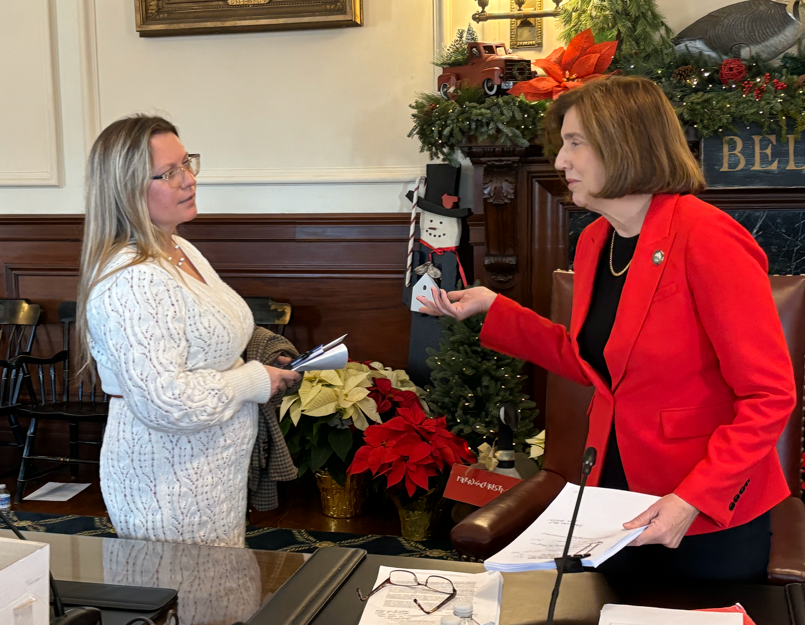By PAULA TRACY, InDepthNH.org
CONCORD – Executive Councilor Cinde Warmington is calling for an investigation into allegations made by two resigning board members that the administration of the state Office of Professional Licensing and Certification is making it hard to do their job.
Created by the legislature as a means for more efficient professional licensing in the state, the OPLC provides administrative, clerical business processing and record keeping functions for about 50 boards that license all working professionals from hairdressers to doctors under RSA 310-A https://www.gencourt.state.nh.us/rsa/html/XXX/310/310-mrg.htm
The outgoing Concord Democrat told Gov. Chris Sununu and fellow members of the state’s five-member Executive Council that this week’s resignations of Vincent A. Baiocchetti III of Gilmanton Iron Works and Eric P. Rochette of Nashua from the Board of Registration of Funeral Directors and Embalmers were of concern given the letters drafted as explanations for their departure.
She urged that the allegations be looked into regarding the OPLC and there was no vote taken or comment.
Baiocchetti, chair of the five-member board who has served as a member of the public since 2017 said before OPLC was formed, “we had a part-time Board Administrator who worked for and with us for almost 30 years,” and things ran well.
“Since OPLC was formed we have had more than five Board Administrators, our complaints are constant and consistent and there are many unanswered questions. These Board Administrators are handling numerous boards and they are unable to keep up with their work. We blame the administration and not the Administrators for trying to do the impossible task of juggling their boards and jobs.”
Rochette echoed the same concerns in his resignation.
“With OPLC in charge, these Boards have become a dictatorship where, and I quote, things will happen whether the Board likes it or not! That is not how a Board functions, nor should it.”
The OPLC has a newly appointed executive director, Deanna Jurius, who follows Lindsey Courtney to the job. Courtney was recently tapped by the governor to be a judge. She served from 2020 to this year and replaced David Grasso who held the job for six months.
Jurius said in a statement: “The Office of Professional Licensure and Certification (OPLC) is committed to providing support for the 57 boards, councils, and commissions that fall within its statutory framework, and working collaboratively with them to ensure that public health and safety are protected without creating unnecessary barriers to workforce entry. Each board, council, and commission, as well as the OPLC, is responsible for executing and following the laws created by the legislature in accordance with directives from executive branch administration.”
The Board of Registration of Funeral Directors and Embalmers oversees 88 funeral homes and 23 crematoriums in New Hampshire. Licenses expire two years after issuance. The board licenses, inspects and regulates funeral homes and crematoriums and individuals for minimum standards, takes disciplinary action against licensees who fail to meet those standards and meets monthly with the next meeting Dec. 11 at 3 p.m. at 7 Eagle Square in Concord.
Remaining board members listed by the state are Matthew Roan, Susan J. Hopkins, and Ryann Healy who are all serving in their capacities as funeral directors.
The OPLC went through restructuring during Fiscal Year 2021 and changed its make up based on job functions.
It has been subject to legislation and criticized but also has received praise in part due to legislative changes in 2023 in which New Hampshire became the first state in New England to offer universal license recognition – or reciprocity – of all professional licenses from other states provided the license is “substantially similar” to New Hampshire’s licenses.
Currently 14 other states offer such reciprocity.
The state received praise from the Josiah Bartlett Center for “streamlining what was otherwise a tedious regulatory process” and also a very time-consuming process making New Hampshire more attractive to professionals to move to, easing the lack of staff particularly in nursing and benefitting New Hampshire’s business climate overall.
Baiocchetti said the board brought complaints to the Enforcement Division of OPLC about wrongdoings by licensees and the complaints he said go unanswered or drag on for an unacceptable period of time.
“OPLC seems to have lost sight that the Boards are supposed to be watchdogs to protect the consumer. We have seen OPLC drop the ball on numerous investigations against licenses, including one that had over 2,000 violations…,” it read.
“The disrespect that the OPLC employees had for our Board members has also caused tension and created an environment which was and is not conducive for working toward serving the craft and consumers for the State of New Hampshire in an effective and efficient manner,” Baiocchetti wrote.





